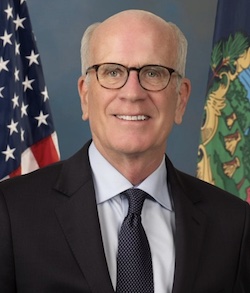By Brent Addleman | The Center Square
Federal legislation introduced Tuesday is aimed at helping homeowners make energy-efficient and clean energy upgrades.
The E-Access Act, introduced by U.S. Sens. Peter Welch, D-VT, and Chris Van Hollen, D-MD, would help direct a clean energy transition by aiding consumers to access their utility data and share it with third parties, allowing families and businesses to make energy decisions by making that data more readily available.

U.S. Sen. Peter Welch, D-Vt.
“We’ve made tremendous progress to advance energy efficiency and clean energy through the Inflation Reduction Act and Infrastructure, Investment, and Jobs Act – but we can do more to help every family benefit from these historic investments,” Welch said in a statement. “The E-Access Act will help consumers access critical data on their home energy use, giving them the tools they need to understand their energy consumption and make changes at home to improve efficiency, lower their energy bills, and help fight climate change.”
Under current law, energy data is hard for consumers to access, creating difficulty in reducing energy consumption, switching to new energy sources, and not taking advantage of the Inflation Reduction Act and Infrastructure, Investment, and Jobs Act programs that would help with those transitions.
The legislation, if enacted, could help Vermont residents amid the General Assembly’s override of Gov. Phil Scott’s veto of Senate Bill 5, known as the Clean Heat Standard.
In a February report, the Ethan Allen Institute said that the bill would “become the state’s largest social program in history and could cost Vermont residents billions of dollars in the coming years. The bill calls for affordably meeting mandated greenhouse gas reductions in the thermal sector by utilizing efficiency, weatherization measures, electrification, and decarbonization.
Under Senate Bill 5, as previously reported by The Center Square, the state’s Public Utilities Commission and the Department of Public Service will work over the next year to finalize rules for clean heat standards and clean heat credits.
Van Hollen said the HOPE for HOMES contained within the Inflation Reduction Act “will make it easier for Americans to lower energy bills” by performing energy efficiency upgrades.
“But right now, it’s hard for homeowners to see exactly how much they can save if they make the switch,” Van Hollen said in a statement. “By making energy data more accessible, the E-Access Act will help consumers see the money-saving potential of making their homes more energy efficient – which in turn will generate more good-paying jobs and move our nation forward in the fight against the climate crisis.”
According to a release, the E-Access Act contained provisions within the Inflation Reduction Act for the HOPE for HOMES program, despite needing more mechanisms for enforcement. The Department of Energy would then be required to establish guidelines for data sharing and mandate states to develop their own rules based on federal guidelines.



Now tell me how this e-access thing is going to create jobs while leaving me to figure out how to lower my energy bills? Jobs, really?
I have replaced all the windows in my house, use weather stripping, turn lights off, turn the fu*^%ng heat down lower than I would otherwise due to the rising costs of heating oil, but converting to heat pumps at the cost of $75K (pre-Covid pricing when I had an estimate done in 2019), so probably higher now – will never pay off for me. I can’t wait to leave this place and in five years or less I will be gone. Thank GOD!
Vermont is a lost cause, no matter how I vote it NEVER makes a difference – the blues keep getting more votes and sanity is thrown out the window. All they will do in the long run is kill the working poor and make the rest of us leave.